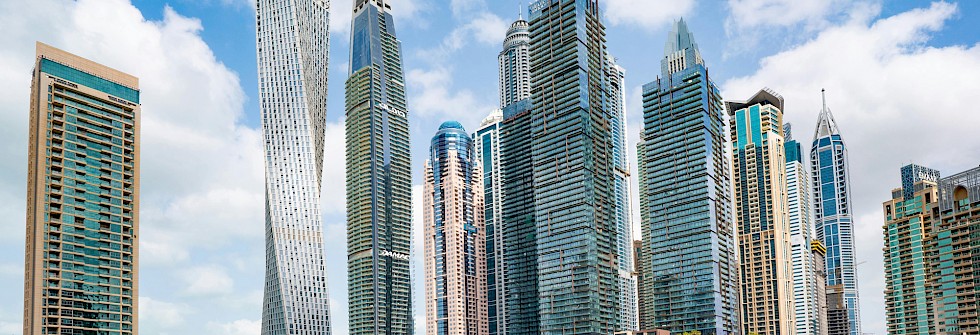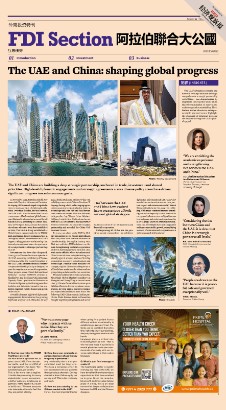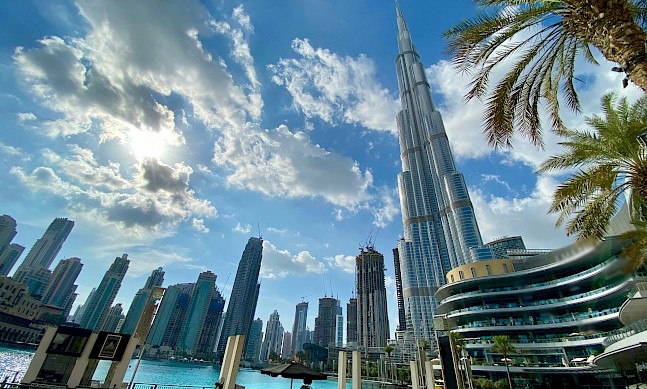The UAE and China are building a deep strategic partnership, anchored in trade, investment and shared priorities. High-level diplomatic engagements and strategic agreements across diverse policy areas have driven significant progress towards common goals.
In November 2024, President Sheikh Mohamed bin Zayed Al Nahyan and President Xi Jinping of China exchanged congratulations to mark 40 years of diplomatic relations. Over four decades, the ties between the UAE and China have evolved into a cornerstone of both nations’ global strategies. Bilateral trade reached a record $101.8 billion in 2024, according to China’s Ministry of Foreign Affairs, around 800 times the volume when ties were first established in 1984. The UAE is firmly established as China’s largest export market in the Middle East, and second-largest trading partner in the region, while China remains the UAE’s largest trading partner – a relationship that has only strengthened since the agreement of a comprehensive strategic partnership in 2018.
Investment ties have also deepened. Over 15,000 Chinese firms now operate in the UAE, according to Ministry of Economy figures, while the recent formation of the UAE-China Investment and Economic Cooperation Working Group is designed to pave the way for new areas of cooperation. Major projects under China’s Belt and Road Initiative – such as COSCO’s terminal at Khalifa Port and the China-UAE Industrial Capacity Zone – position the Emirates as China’s Gulf gateway, facilitating seamless logistics and industrial capacity that underpin regional supply chains and global trade routes.
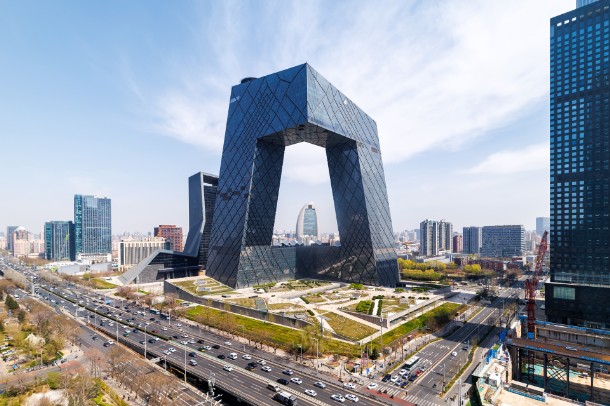
A wealth of recent high-level diplomatic engagements demonstrates the growing depth and scope of UAE-China ties. In May 2024, Sheikh Mohamed paid a two-day visit to Beijing to meet with Chinese President Xi Jinping, during which wide-ranging agreements spanning areas including energy, technology and joint Belt and Road investment were announced. That was followed, in September, by Chinese Prime Minister Li Qiang’s visit to Abu Dhabi, where he met with the UAE President to discuss further efforts to boost the two countries’ strategic partnership and attended the China-UAE Business Forum.
In 2025, two visits to the UAE by China’s Special Envoy for Middle East Affairs, Zhai Jun, have seen further advances in the relationship. During his January visit, Zhai met with key UAE ministers to discuss strengthening bilateral cooperation, while his April engagement included talks with senior officials where he underscored China’s commitment to implementing previously agreed accords and accelerating cooperation in energy, infrastructure and technology. Beyond these headline exchanges, regular diplomatic delegations at all levels have maintained a robust and ongoing dialogue between the two countries.
Ties between the UAE and China have evolved into a cornerstone of both nations’ global strategies.
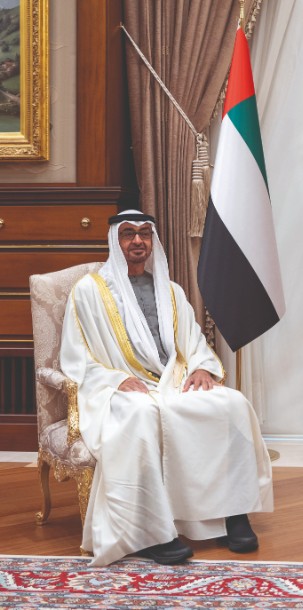
Financial collaboration is also advancing. Abu Dhabi Global Market’s roadshow in Shanghai and Hong Kong attracted more than 75 Chinese financial institutions, spotlighting efforts to deepen regulatory cooperation, develop capital market synergies and expand bilateral investment flows. The follow-up UAE-China summit, held as part of Abu Dhabi Finance Week in December, brought together policymakers and sector experts in a show of further economic and financial cooperation.
Underpinning all of this are the people-to-people connections that reinforce diplomatic and commercial ties. “UAE-China relations are based on mutual trust, mutual respect and common interests,” Sheikh Mohamed said during his 2024 visit to Beijing. With those common interests extending across strategically critical areas from energy and infrastructure to digital innovation and green technologies, the partnership is set to shape a new era of mutual development that will deepen economic integration and foster sustainable growth, exemplifying a model of international cooperation in a shifting geopolitical landscape.
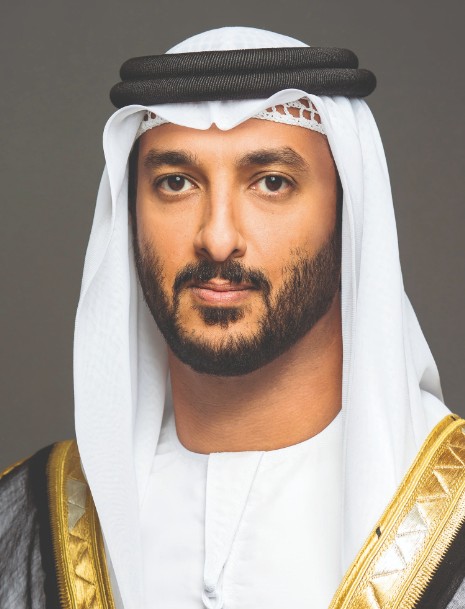
“Today, three quarters of our GDP is non-oil and the sector continues to grow in a strong and sustainable fashion.”
H.E. Abdulla Bin Touq Al Marri, Minister of Economy
Post ThisQ: How does the Ministry support the UAE’s economic growth and investor appeal?
Thanks to its geographic location, our country has always been a strategic global hub facilitating trade and logistics between different corners of the world. Today, it serves as a gateway to a vast consumer base exceeding two billion people in Asian and African markets.
The Comprehensive Economic Partnership Agreement (CEPA) programme, led by the Ministry of Economy, has had a tremendous impact on the unprecedented growth in the UAE’s non-oil trade. We have signed CEPA deals with 15 countries so far. As we pursue more deals, we expect further growth, moving closer to our goal to increase non-oil trade to AED 4 trillion ($1.1 trillion) by 2031.
Q: What role does the UAE’s partnership with China play in national economic development?
Our two countries share a historical and strategic relationship characterised by continuous development of fruitful cooperation across all fields, particularly in the economy and investment. I attribute this growth to the shared commitment of both leaderships to advancing constructive cooperation, stimulating investment exchanges and enhancing the growth of Emirati and Chinese companies in both markets.
In 2024, memoranda of understanding (MoU) were signed between CCPIT Tianjin and the Abu Dhabi Chamber, Tianjin Pilot Free Trade Zone and JAFZA, and Tianjin Port Group and DP World, further deepening our economic collaboration. All these agreements facilitate trade and improve logistics, unlocking new investment opportunities and underscoring the pivotal role of both public and private sectors in our economic engagement.
Q: How does the UAE encourage Chinese foreign direct investment (FDI)?
The Chinese business community is a key economic partner of the UAE’s business sector. Today there are more than 15,000 business licences fully or partially owned by Chinese companies or individuals. Their investments in the UAE economy total $6 billion, primarily in the retail, financial services, real estate and construction sectors.
We are working in cooperation with our partners in the Chinese government to broaden collaboration in areas of shared interest, such as the new economy, entrepreneurship, tourism, aviation and logistics. We are also working to enhance dialogue between the business communities of the UAE and China, alongside establishing frameworks for the advancement of SMEs in both markets.
The opportunities for economic collaboration between our two countries keep growing as the UAE continues to enhance its business environment and economic openness through progressive policies and global partnerships.
Q: How are you exploring cooperation in green investments?
The UAE’s growing investments in green and circular economies are creating more opportunities for collaboration. The latest partnership in this regard is the MoU between Masdar and China’s Silk Road Fund to explore potential co-investment opportunities in renewable energy projects in Belt and Road Initiative countries, primarily in the developing world and Global South.
The global investment gateway
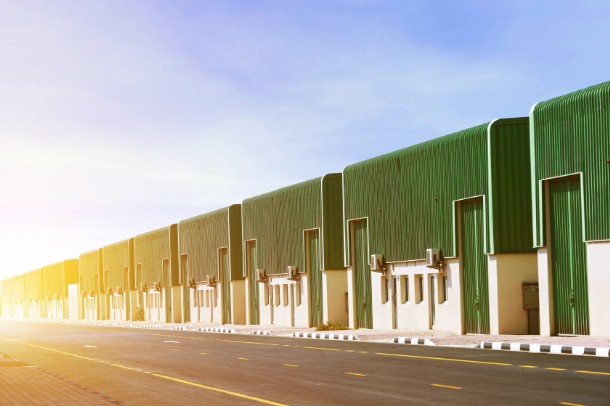
Occupying a strategic location and benefiting from modern, purpose-built infrastructure, Sharjah Airport International Free Zone (SAIF Zone) offers unparalleled mixed-use business and warehousing space with easy access to sea, land, and air transport links. SAIF Zone’s state-of-the-art facilities for manufacturing, assembling, and packaging—together with visa, customs, financial, and immigration services that accommodate investors across diverse industries—have already made it a magnet for around 8,000 organisations, representing the commercial, light industrial, and service sectors.
As such, SAIF Zone is the ultimate destination for entrepreneurs aiming to grow in the Middle East. “We prioritise the happiness of our customers and their agility in doing business—if they need help to expand their businesses, we are there to support them,” explains Director Saud Salim Al Mazrouei. “We ensure we are always aligned to solve any problems; we understand what investors want and provide for them within the free zone.”
One of the zone’s main goals is to ensure that customers can focus their resources on growing and operating their businesses without being hindered by red tape. “We consider our investors as partners,” the director says. “We want to develop harmony among the industries to allow more synergy between them, creating advantages, minimising risks, and attracting more projects within the region.”
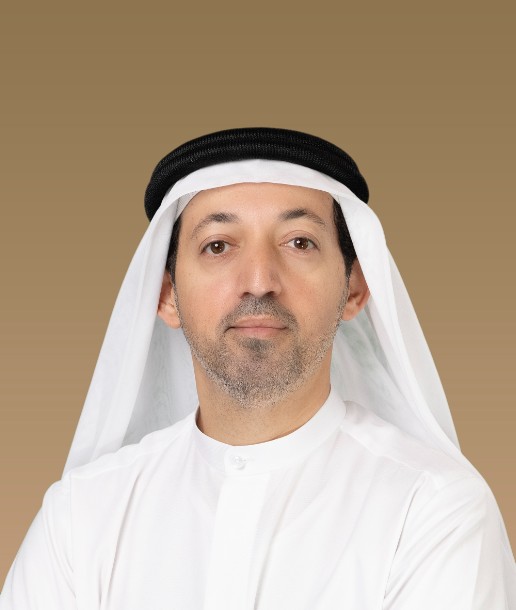
“We want to develop harmony among the industries to allow more synergy between them, creating advantages, minimising risks, and attracting more projects within the region.”
H.E. Saud Salim Al Mazrouei Director, Sharjah Airport International Free Zone (SAIF)
Post ThisSAIF Zone is the ultimate destination for entrepreneurs aiming to grow in the Middle East.
As SAIF Zone’s expansion continues, the Far East is expected to become an increasingly important market. The agency is working with its government counterparts in China, Malaysia, Singapore, and Thailand, exploring different ways to support businesses by providing a platform to access the Middle Eastern and African markets. “We see significant potential and opportunity here,” says Al Mazrouei, “and are targeting industries that will complement and add value to our investors.” Naturally, innovation goes hand in hand with new growth. “We are aligning an AI strategy with new innovations while maintaining the importance of the human element in our relationship with clients,” he adds. “We are excited about what comes next.”
